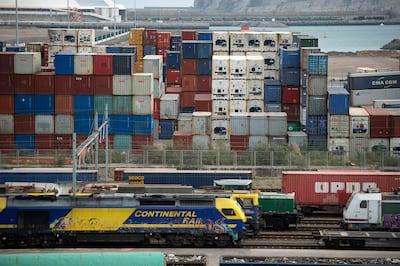The days of “just-in-time” supply chain management will end in 2022 with FinTech start-ups perfectly poised to tap this space as global trade is reset amid the Ukraine war, Covid-19 and climate change demands.
David Hansom, partner, global procurement at law firm Clyde & Co, told delegates at the Trade & FinTech forum hosted by the Arab-British Chamber of Commerce in London, that supply chain models as we know them will change from this year.
“From a geopolitical perspective, there are very real threats to the just-in-time supply chain,” Mr Hansom said. And this year will mark the end of businesses ordering goods that arrive days later to fulfil an order, he said.
This is not simply because of the Russian invasion of Ukraine but also the increasing physical, financial and non-financial barriers creeping into the market from sanctions, to the fallout from the Covid-19 pandemic, soaring shipping costs, tighter regulation and the complications of Brexit, he said.
“There are obviously a range of new sanctions. Those sanctions, whether we like it or not, impact on the trade we all do. There's the risk of blocked trade routes and the risk of deliveries being delayed,” Mr Hansom said.
However, Brexit and the imposition of financial barriers to trade are also having an effect, he said, despite new trade deals being introduced in the UK, many of which are a “copy and paste” of the exiting deals the EU has in place.
“In the absence of a trade agreement, new barriers are imposed [with] limitations on how much can be imported; limitations on when it can be imported and through what channels and the taxes that apply,” Mr Hansom said.
As a result, the just-in-time model, first adopted by goods and services producers across globe in the 1950s, could be coming to an end.
The concept came into play when Toyota engineer Taachi Ohno saw the model as a way of eliminating “waste” in the production and movement of goods.
Instead of wasting time, labour and money by storing key components in warehouses or next to assembly lines, Ohno’s idea required suppliers to only deliver what was needed – reducing the need for businesses to spend on maintaining inventories.
Fast forward to the modern day and every supplier is expected to deliver products promptly to the next buyer in the supply chain – an increasingly challenging prospect over the past two years after the Covid-19 pandemic hammered the global economy and closed factories and businesses.
While consumers are continuing to spend, shrugging off rising inflation, the just-in-time world is becoming increasingly prone to crisis as businesses grapple with the Ukraine war, rising fuel prices and escalating shipping rates.

As a result, retailers, anxious to ensure they are not again caught up in delays, are building up inventories to meet expected spells of peak demand, juggling "just in time” and “just in case” inventory management.
Add the heightened scrutiny on the environmental effects of supply chains, as well as ethical sourcing, and it is easy to see why the supply chain models of today will have to change.
“So, is it sustainable to fly beef from Australia? Is it sustainable to produce 80 per cent of the world's lithium from one country, against the backdrop of the electric vehicle?” Mr Hansom said.
'Bright future for FinTech'
With rising inflation – set to hit double digits in the UK this year – also posing a challenge, companies will increasingly need to adopt FinTech as a way of revolutionising the supply chain.
“Supply chains should be robust, sustainable and set up for success,” Mr Hansom said.
“That means that you've got people working together to drive change to deal with global problems head on ... and FinTech in all of its many guises is perfectly placed to tick all three of those boxes.”
With about 26,000 FinTech businesses operating globally employing 500,000 people, and 30 per cent of retail customers in banking using at least one service from a non-traditional bank provider, the future for FinTech is bright, said Mr Hansom.
Clyde & Co’s blockchain consultancy, for example, is already writing contracts for the shipping industry that are automated, a move that stops people making decisions about when payments are due or when an insurance premium charge can be refunded.
An example of this is the insurance premiums for cargo ships travelling to more dangerous waters where they are at risk of piracy.
Internet of Things' sensors report back to the insurer and the premium goes up for the duration of that part of the journey in which danger lurks, rather than for the entire crossing.
With more scrutiny on corporate social responsibility, and improvements needed in the audit trail and accountability of supply chains, Mr Hansom predicts “a real growth market in ethical contracting”.
“In the next five to 10 years, I see the trust that can build into supply chains through blockchain, through the use of distributed ledger technology," he said.
"This has been absolutely transformational, in the context of driving up trust, driving up security, speeding up supply chains and derisking transactions.”
With customers looking at how a business approaches technology and its compliance with best practices globally, as well as decarbonisation, Mr Hansom said there is so much scope to use technology to drive down carbon production and to improve supply chain flows.
"The market is ready for those bright ideas, ready for those seed funders, ready for those start-ups, ready for those investors to have a good idea and to run with it," he said.


